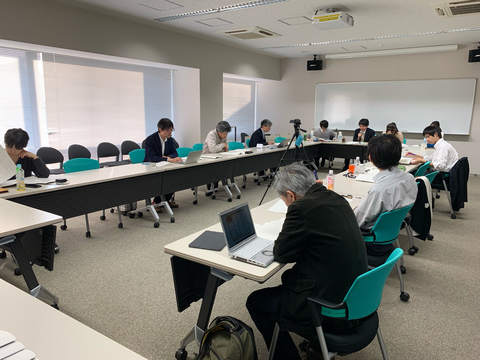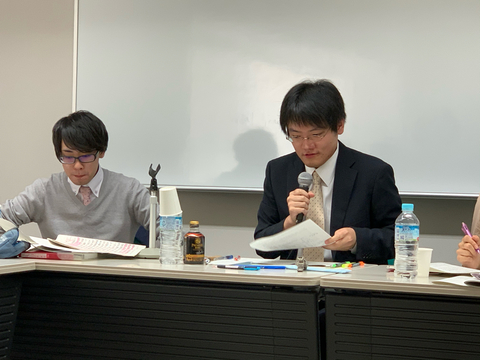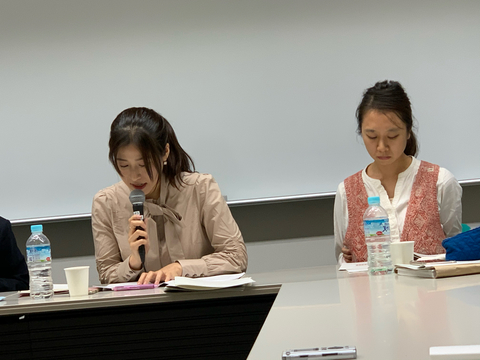Basic Information
Summary
Kawano Tomoya (MA Student, Hokkaidō University)
A Commentary on Fujiwara no Yasunori Den: Reexamining the Legacy of the Administration in Dewa
Yang Huijing (PhD Student, Kyōto University)
About the Park Manuscript of Yuhap: Focusing on Japanese and Hangul Glosses
Commentators: Yumiyama Shintarō (MA Student, Kyōto University), Heo Jihyang (Visiting Researcher, Ritsumeikan University)
Host
Development of the Next Generation of East Asian Classical Studies through International Collaboration—From the Perspective of the Frontier of the Realm of Chinese Characters
Reports
This time Kawano Tomoya (MA student, Hokkaidō University) and Yang Huijing (PhD student, Kyōto University) gave presentations. Yumiyama Shintarō (MA student, Kyōto University) and Heo Jihyang (Visiting Researcher, Ritsumeikan University) were our commentators.

Mr. Kawano’s presentation about The Biography of Fujiwara no Yasunori (907), a text recorded in kanbun by Miyoshi Kiyotsura in the early Heian period, focused on and attempted to re-read the description of Yasunori’s administration in the Dewa province. He observed that, in contrast with recordss where the people of Bitchū, Bizen, and Dazaifu were reformed by virtuous example through the concept of “charity,” it is recorded that in Dewa the “barbarians” were subjugated by means of “dignity,” pointing out that the depiction of Yasunori’s figure in the descriptions of Dewa differs from his image as practicing the principles of virtuous governance in the other three provinces. Then, based on the point that the term “barbarians” is used, Kawano argued that the Biography was written based on a world view that considers the court as a central kingdom, in line with Confucian values.
Mr. Yumiyama, a commentator, asked about the possibility that Kiyotsura’s figure, who was also an official, was projected onto the image of Yasunori in the Biography. Also, it was pointed out from the floor that the descriptions of “barbarians” were possibly based on patterns found in historical narratives such as The Book of the Later Han, and there were discussions about issues with reading histories written in kanbun during that time.

Ms. Yang’s presentation about the Yuhap, a kanji learning book that has been distributed since the 16th century, along with summarizing a bibliography of various manuscripts remaining in Japan discussed its position as a primer for learning kanji. She focused on Japan’s existing manuscripts, especially those held in Kyoto University’s Faculty of Literature Library that have not been taken up in previous studies and described features such as the book that is thought to be the original copy and marginal notes about Japanese readings and correct characters. Moreover, Yang pointed out that, in contrast with the Chinese text Thousand Character Classic that was created using classical idioms of historical events and literature, the Yuhap is based on words related to daily life, and she argued that the stream of kanji’s modernization on the Korean peninsula can be seen in the formation and distribution of the Yuhap.
Ms. Heo (the commentator) asked about the possibility that the Kyoto University manuscripts had been transmitted through the hands of several owners. In addition, there were questions from the floor about whether there was a connection between the Yuhap and Kaibara Ekiken’s Senji ruigō as well as discussions about connections with modern dictionaries.

These two presentations dealt with issues of how kanji and kanbun texts spread out from the Chinese continent and developed in Japan and Korea, raising various points in regard to what kinds of authors produced what kinds of styles and books in their respective time periods and regions.
(Tobita Hidenobu, PhD student, University of Tokyo)
About the Platform for Rising Scholars
The Platform for Rising Scholars was started in 2016 as part of the Creation of a Next-Generation Hub for East Asian Classical Studies: Accelerating Research and Education through International Collaboration (headed by Saitō Mareshi), with hopes of providing young researchers with an opportunity to share their research and communicate with one another. This platform encourages promising researchers, including graduate students, post-doctors, assistant professors, and lecturers, to present their research outside of their home institutions. Commentators are likewise selected from among young researchers for the purpose of promoting inter-institutional communication.






